October 6 - Research Workshops October 7 - Research Symposium Atlanta, GA
American Nurses Enterprise Research Symposium
October 6 & 7 Atlanta, GA
ANA Enterprise Research Symposium

Endnote Moderator
Teresa Trammell
CPNP-AC, FNP, APRN, MSN, MHA
Teresa is a duel certified nurse practitioner who specializes in pediatric trauma, high risk delivery, and family medicine. She works with EBSCO Information Services as a clinical consultant, while continuing her practice to provide patient care with a focus on the homeless, indigenous, and migrant populations.
She completed her Bachelor of Science in Nursing at Baylor University, earned her Master of Science degree in the Nurse Practitioner program from Duke University, and has a Master of Healthcare Administration from the Medical University of South Carolina.
Teresa has taught at Emory University in the Nell Hodgson Woodruff School of Nursing, the Medical College of Georgia, and has served in multiple roles focused on the education of nurses and medical residents. She has worked in several roles as an innovative nurse leader at the Medical University of South Carolina, the Children’s Hospital in Atlanta, Emory Healthcare, and the Wellstar Health System. Teresa has also participated as a cardiac researcher at the Medical University of South Carolina, has reviewed and written for the National Council of State Boards of Nursing NCLEX exam, participated in several research publications, and continues to present at numerous medical and nursing conferences.
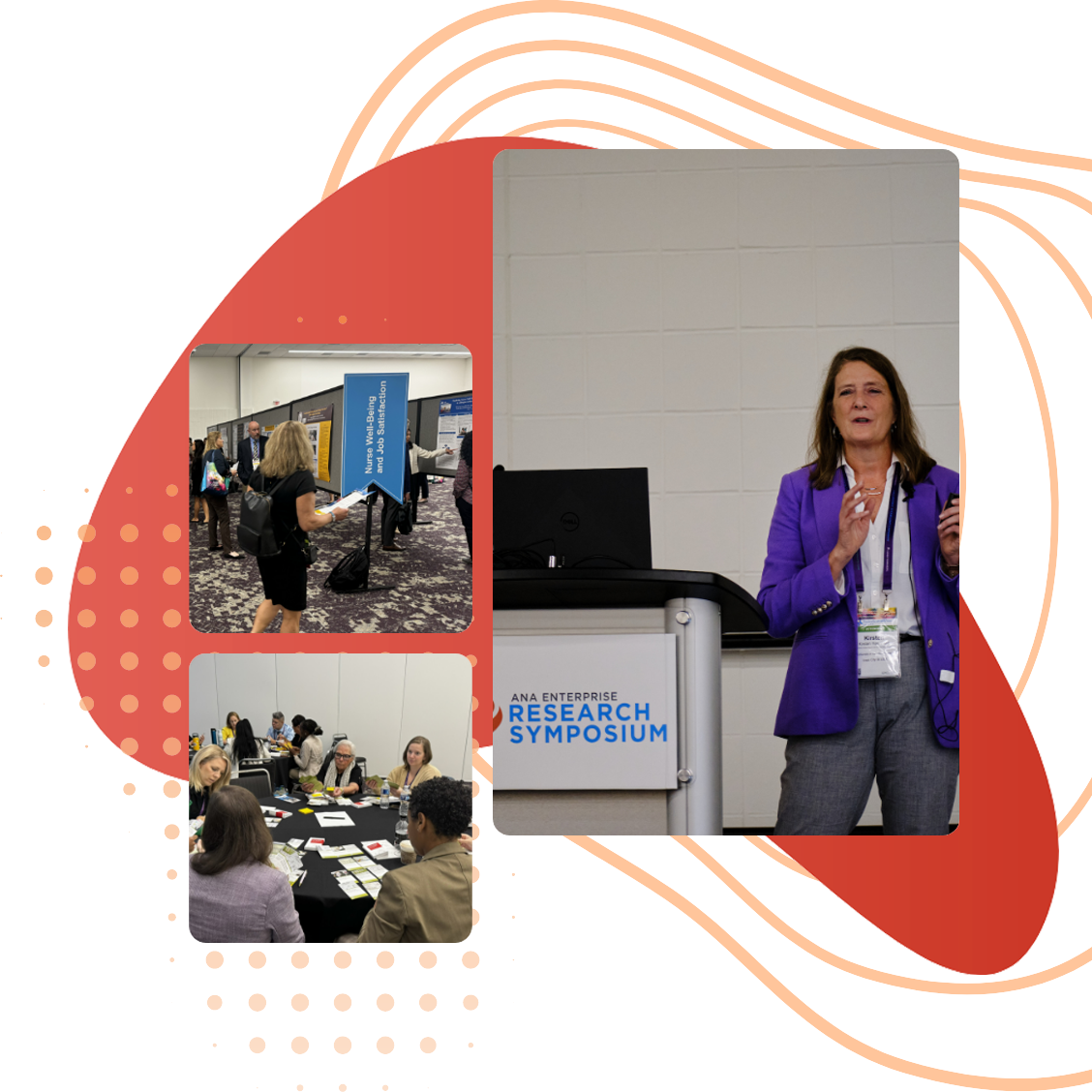
Research Frontiers
2025 Amplifying the Value of Nursing through Transformative Research

Highlights
- New! Research Workshops:
ROI, EBP, Research Methods, and Storytelling for Impact (Oct 6, separate registration) - Advanced Technologies: Explore AI, virtual reality, and simulations in nursing research.
- Practice-Based Projects: Steps to develop successful research initiatives.
- DEIB Focus: Integrating diversity, equity, inclusion, and belonging in research.
- Research Methods: Insights on EBP, QI, implementation, and more.
- Diverse Engagement: Involving nurses from varied backgrounds in research.
- Research Culture: Building inquiry, development, and mentorship.
- Interprofessional Support: Advocating for a research-friendly collaborative environment.
- Poster Presentations: More poster presentations and peer-driven insights than ever before.
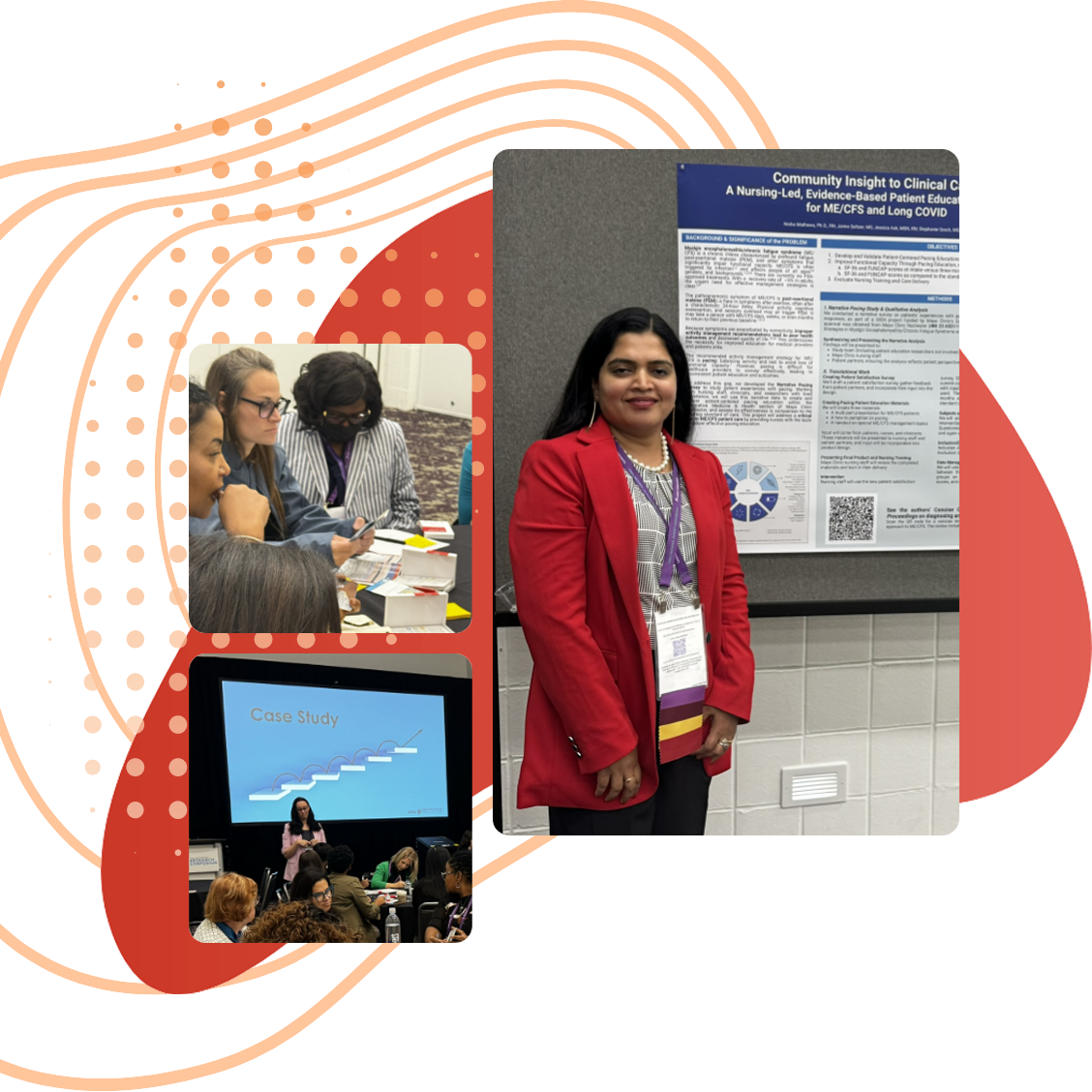
innovate and research
Empowering Nursing Through Advanced Research Techniques
-
Event Overview:
Join American Nurses Enterprise for the "Amplifying the Value of Nursing through Transformative Research" at the Research Symposium on October 7 in Atlanta, Georgia. New this year, we are hosting four 3-hour workshops on October 6. -
Audience:
Ideal for nursing leaders, educators, researchers in all phases of research, especially practice-based, and those developing research programs. -
Organizers:
Hosted by the American Nurses Enterprise Research Advisory Council and the Institute for Nursing Research and Quality Management. -
Conjunction Event:
Held as a pre-conference to the ANCC National Magnet Recognition® and ANCC Pathway to Excellence® Conferences. -
2025 Theme:
Focuses on Amplifying the Value of Nursing through Transformative Research. -
New Workshop Day October 6:
Workshop sessions on Quantifying Nursing’s Economic Value Contributions, Evidence-Based Practice, Strengthening and Scaling Nursing Research, and Storytelling to Elevate Nursing’s Value and Impact. -
Why Attend:
After attending the symposium, participants will be able to:
- Integrate qualitative and quantitative research methods into an organizational research program.
- Develop interprofessional collaboration and clinical-academic partnerships.
- Identify and overcome challenges to nursing research.
- Build an inclusive and diverse research team addressing inequity in healthcare.
- Bring back innovative solutions to research teams and the organization.
- Carry forward a renewed spirit and strategies to sustain that spirit in research. -
Registered attendees may earn up to 14 contact hours* for attending concurrent podium presentation(s), poster presentation(s), and workshop(s) by following these instructions before Monday, December 15, 2025, 12noon ET.
* Amount of contact hours is subject to change without notice.
At a Glance
Research Symposium Agenda, Oct 7
-
7:00 AM – 8:00 AM
Breakfast, Registration & Poster Networking
-
8:00 AM – 9:00 AM
Opening Keynote: Pioneering the Future: Unleashing the Power of Innovation in Nursing Research
Katherine “Kat” Scafide, PhD, MSN, RN, FAAN, FAAFS
Dr. Scafide is a tenured Associate Professor in the School of Nursing at George Mason University.
-
9:15 AM - 10:15 AM
Concurrent Session 1
-
10:30 AM - 11:30 AM
Concurrent Session 2
-
11:30 AM - 12:45 PM
Lunch, Awards & Value of Nursing Presentation
Lorem ipsum dolor sit amet, consectetuer adipiscing elit. Donec odio. Quisque volutpat mattis eros. Nullam malesuada erat ut turpis. Lorem ispum dolor sit amet.
-
12:45 PM - 1:30 PM
Attended Poster Session
-
1:45 PM - 2:45 PM
Concurrent Session 3
-
3:00 PM - 4:00 PM
Concurrent Session 4
-
4:30 PM – 5:30 PM
Endnote Plenary: Beyond the Evidence: Amplifying the Value of Nursing Through Transformative Research
Katherine “Kat” Scafide, PhD, MSN, RN, FAAN, FAAFS, George Mason University
Olga Yakusheva, PhD, FAAN(h), Professor, The Johns Hopkins School of Nursing
Moderator: Oriana Beaudet, DNP RN, ANA Vice President of Nursing Innovation

Opening Keynote Speaker
Katherine “Kat” Scafide
PhD, MSN, RN, FAAN, FAAFS, Associate Professor, School of Nursing, George Mason University
A nationally recognized forensic nurse scientist, Dr. Scafide began her clinical career as a pediatric and adult sexual assault nurse examiner and later served as a death investigator for the State of Maryland’s Office of the Chief Medical Examiner. She earned both her MSN and PhD from Johns Hopkins University.
At Mason, Dr. Scafide teaches and mentors doctoral students while leading a federally funded program of research focused on advancing health equity in the identification and documentation of injuries among survivors of violence, particularly individuals with darker skin tones. She directs an interdisciplinary research team that integrates nursing, health informatics, and engineering to develop innovative, technology-enhanced approaches to injury detection.
Dr. Scafide is principal investigator of the Equitable and Accessible Software for Injury Detection (EAS-ID) project, a groundbreaking initiative aimed at developing a smartphone-based application that combines alternate light source (ALS) imaging, medical data, platform connectivity, and deep learning to equitably detect and characterize bruises across diverse skin tones. This work includes building a national repository of bruise images, integrating with electronic health records, and developing AI tools that support—rather than replace—clinician judgment.
Her scholarship includes numerous peer-reviewed publications in top forensic and nursing journals and frequent presentations to national and international audiences. Dr. Scafide is a Fellow of both the American Academy of Nursing and the American Academy of Forensic Sciences.

Endnote Plenary Speakers
Olga Yakusheva
PhD, FAAN(h), Professor, The Johns Hopkins School of Nursing, The Johns Hopkins Business of Health Institute, Economics Editor, International Journal of Nursing Studies
Dr. Yakusheva is an economist with research interests in health economics and health services research. Yakusheva's area of expertise is econometric methods for causal inference, data architecture, and secondary analyses of big data. The primary focus of Yakusheva’s research is the study of the economic value of nursing/nurses. Yakusheva pioneered the development of a new method for outcomes-based clinician value-added measurement using the electronic medical records. With this work, Yakusheva was able to measure, for the first time, the value-added contributions of individual nurses to patient outcomes. This work has won her national recognition earning her the Best of AcademyHealth Research Meeting Award in 2014 and a Nomination in 2018. Yakusheva is currently a PI on two AHRQ funded R01s aiming to optimize the hospital nursing workforce and ANA Enterprise funded research to conceptualize a new model and definition of the economic value of nursing.
Yakusheva is a team scientist who has contributed methodological expertise to many interdisciplinary projects including hospital readmissions, primary care providers, obesity, pregnancy and birth, and peer effects on health behaviors and outcomes. In 2023, Yakusheva was awarded an Honorary Fellowship from the American Academy of Nursing.
Yakusheva holds a PhD in economics, an MS in economic policy, and a BS in mathematics.
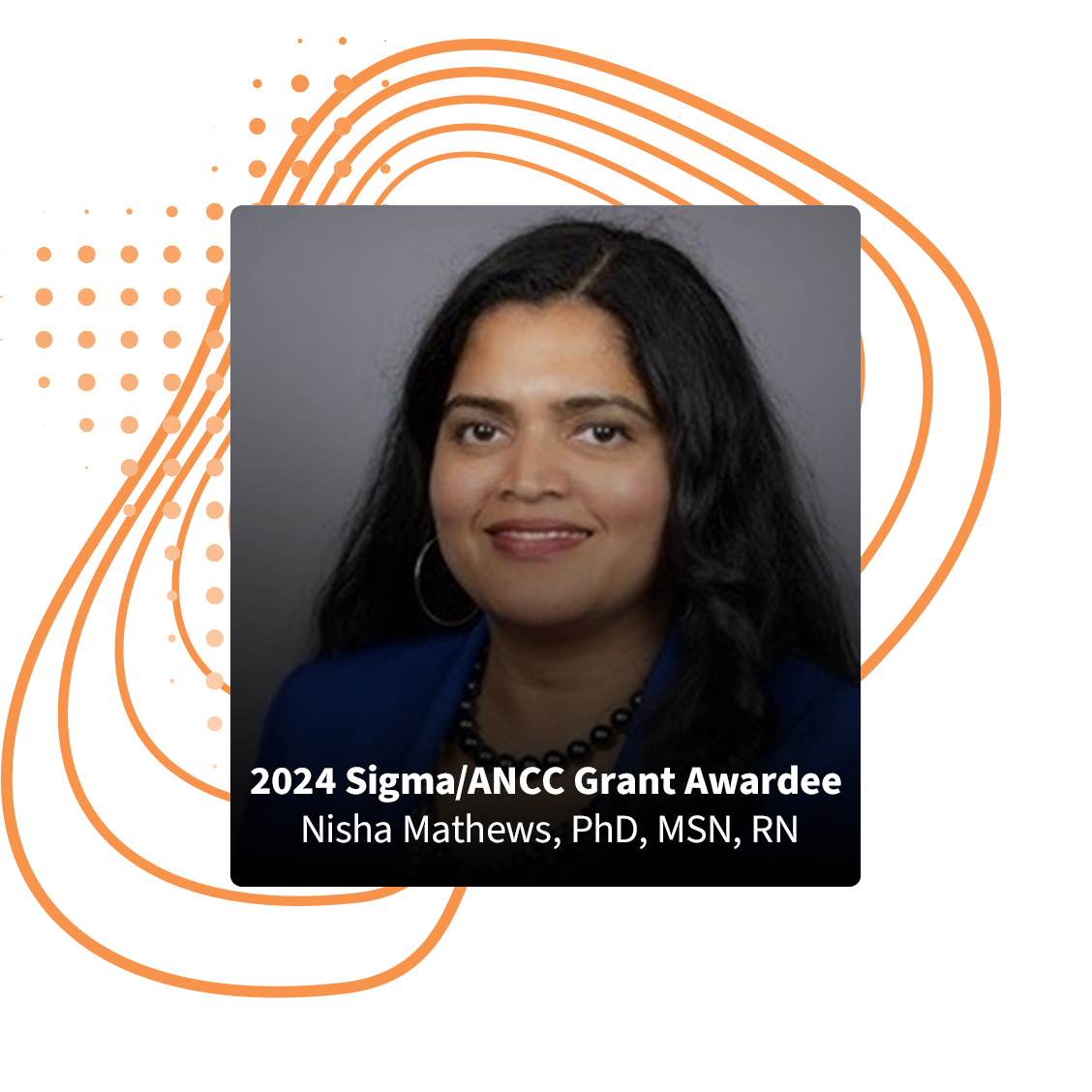
2025 Sigma/ANCC Evidence-Based Practice Implementation Grant Awardee
Awardee will be Announced in September!
Grants available: 1 annually
Funding: US $20,000
Deadline: 1 July
October 6, 2025 | Atlanta, GA
Research Workshop Presenters

Madeleine Whalen
MSN/MPH, RN, CEN, NPD-BC

Judith Ascenzi,
DNP, RN

Nancy Albert
PhD, CCNS, CHFN, CCRN, NE-BC, FAHA, FCCM, FHFSA, FAAN

Adriane K. Griffen
DrPH, MPH, MCHES®

Olga Yakusheva
PhD, MSE, FAAN

Kathryn Lee
PhD, RN

Marianne Weiss
DNSc, RN
Research Workshop Details
Morning Workshops | 9:00 AM - 12:00 PM
Morning Workshops | 9:00 AM - 12:00 PM
Methods for Quantifying Nursing’s Economic Value Contributions
Olga Yakusheva, PhD, MSE, FAAN
Kathryn Lee, PhD, RN
Marianne Weiss, DNSc, RN
In this workshop, the team of nursing economic value experts will guide participants in identifying ways to measure the revenue contribution and economic return on investment (ROI) of new nursing development programs, redesign of staffing models, and implementation of new interventions for use in quality improvement, evidence-based practice, innovation, and clinical research evaluations. Workshop activities will include identifying potential cost-offsets and monetizable quality and safety outcomes to build the economic business case for investments in nursing.
Evidence-Based Practice Workshop
Madeleine Whalen, MSN/MPH, RN, CEN, NPD-BC
Judith Ascenzi, DNP, RN
Join the editors and authors of the 5th edition of the Johns Hopkins Evidence-Based Practice Model and Guidelines for this hands-on, interactive workshop. Participants will explore the purpose of EBP, why it matters, and when to use it to solve clinical problems. Next, they will be taken on a high-level tour of the key phases of the EBP process—Practice, Evidence, and Translation (PET). Finally, they’ll uncover helpful resources to continue building both their own, and their staff’s EBP skills into the future. Participants will leave with practical knowledge and concrete next steps to build evidence into their practice.
Afternoon Workshops | 1:00 PM - 4:00 PM
Afternoon Workshops | 1:00 PM - 4:00 PM
Research Methods Learning Workshop: Strengthening and Scaling Nursing Research
Nancy M. Albert, PhD, CCNS, CHFN, CCRN, NE-BC, FAHA, FCCM, FHFSA, FAAN
This interactive workshop is designed for nurse researchers who want to strengthen the quality of research designs and methods used (for self and mentored projects) and to expand into multi-site research projects. The session incorporates foundational and intermediate quantitative research methodologies that work well in clinical settings and key considerations for conducting high-quality research across multiple sites. Participants will engage in a blend of didactic learning, small group discussions, and hands-on exercises using real-world examples. The workshop draws on resources including the ANCC Research Council Multi-Site Research Playbook (2021).
Foundation Friends: Storytelling to Elevate Nursing’s Value and Impact
Adriane K. Griffen, DrPH, MPH, MCHES®
This interactive workshop will highlight current American Nurses Foundation grant recipient pitch talks and provide strategies to convince a funder in 2 minutes why they should fund your research, methods to improve research dissemination through storytelling, and teach attendees how to develop powerful messaging that effectively communicate the value, impact, and ROI of your research to various audiences and stakeholders. Resources on how to assess your bias in critiques of pitches will be shared with the audience.
Event Essentials
Research Symposium Details at a Glance
- Program Overview
- Why Attend?
The symposium commences with an opening keynote distinguished research leader and closes the day with an endnote panel. The event format will be in-person, with concurrent sessions in several tracks all day from which participants can choose, including panels and interactive programming. Lunch is included as an intimate networking opportunity and posters will be presented.
This year we have added a workshop day on October 6, with two morning (9:00am-12:00pm) and two afternoon (1:00-4:00pm) sessions. Topics are on Research Methods, Multi-Site Research, Evidence-Based Practice, and Pitch Day: Elevating Nursing’s Value and Impact. Separate registration is required and space is limited.
After attending the symposium, participants will be able to:
- Integrate qualitative and quantitative research methods into an organizational research program.
- Develop interprofessional collaboration and clinical-academic partnerships.
- Identify and overcome challenges to nursing research.
- Build an inclusive and diverse research team addressing inequity in healthcare.
- Bring back innovative solutions to research teams and the organization.
- Carry forward a renewed spirit and strategies to sustain that spirit in research.
October 7, 2025
Research Symposium Sessions
- Concurrent Session 1 | 9:15 AM
- Concurrent Session 2 | 10:30 AM
- Concurrent Session 3 | 1:45 PM
- Concurrent Session 4 | 3:00 PM
RS01-A
Shared Governance Evolution
System-Wide Shared Governance Research Encourages Engagement
Celeste Romp, DNP, APRN, CCNS, CPHQ, CCRN, Prisma Health and Matthew Hall, MSN, MA, RN, CCRN, PCCN, Prisma Health
Shared governance, stronger practice. Nurses involved in SG councils reported a more positive professional environment. The study found clear links between SG effectiveness and work quality—highlighting SG as a powerful driver of engagement, growth, and research across the system.
Improving Nursing Shared Governance Through Research in a Multi-Site Healthcare System
Rebecca Babb, MSN, APRN, CPNP-AC, CPHON, Inova Health System and Kathleen Russell-Babin, PhD, RN, NEA-BC, ACNS-BC, Inova Health System
Nurses across a Mid-Atlantic health system shared how shared governance, engagement, and evidence-based practice shape their culture—highlighting how nurse-led research can elevate care, foster collaboration, and strengthen professional practice system-wide.
Association of the Nurses' Perceptions Among Shared Governance, Psychological Empowerment, and Turnover Intentions in Acute Care Hospitals
Emma Aquino-Maneja, DNP, RN, CCRN, Kaiser Permanente
When nurses are empowered to share decision-making with leaders, they are more likely to stay in their roles and deliver better patient care. Strengthening shared governance may be a powerful strategy to boost retention and transform clinical outcomes.
RS01-B
Clinical Assessment & Early Warning
Retrospectively Examining the Probability of Acute Skin Failure Among Hospitalized Patients With Hospital-Acquired Pressure Injuries
Natalie Bermudez, PhD, RN, EBP-C, Baptist Health South Florida and Tori Hatch, BSN, RN, CWCN, Bethesda Hospital East/West | Baptist Health South Florida
Acute skin failure (ASF) in patients with severe pressure injuries can be misdiagnosed. By integrating ASF assessment into nursing practice, nurses can lead the charge to improve diagnostic accuracy and reduce hospital-acquired pressure injury penalties.
Enhancing Skin Assessment: Infrared Spectroscopy Across All Skin Tones
Mary Lee Potter, PhD, MBA, RN, CWOCN, Methodist Hospital Metropolitan
Near-infrared spectroscopy, backed by AI trained on diverse skin tones, showed high sensitivity in detecting early pressure injuries—especially in patients with dark skin. This promising tool could overcome traditional assessment limits, enabling earlier diagnosis and better outcomes.
Influence of the CONCERN Early Warning System on Unanticipated ICU Transfers, In-Hospital Mortality, and Length of Stay: Results From a Multi-Site Pragmatic Randomized Controlled Clinical Trial
Kenrick Cato, PhD, RN, CPHIMS, FAAN, FACMI, University of Pennsylvania / Children’s Hospital of Philadelphia
By leveraging nursing documentation, the CONCERN early warning system identified patient decline sooner—reducing deaths and hospital stays after unexpected ICU transfers. Empowering nurses with predictive tools like CONCERN enables earlier intervention and improves outcomes.
RS01-D1: Temporary Toilet Lids Minimize Contamination of Bathroom Surfaces With Hazardous Drugs
No CNE will be provided for this session
Grace Allen, MSN, RN, OCN, Orange Coast Medical Center and Sadeeka Al-Majid, PhD, RN, FAAN, Orange Coast Medical Center
Low-cost interventions can improve safety for healthcare workers and patients. When uncovered toilets used by chemotherapy patients are flushed, bathroom surfaces can be contaminated with hazardous drugs. Reusable toilet lids and bleach-based cleaning can significantly reduce contamination.
RS01-C
Technology & AI Innovations
The Impact of AI in HIV Care Through a Diplomacy Lab Initiative
Deborah Brabham, RN, PhD, CNE, UF Health Jacksonville and Renata Henderson, RN, DNP, CNE, Florida State College at Jacksonville
Through a Diplomacy Lab, nursing students tackled real-world HIV care challenges while building AI and critical thinking skills. Embedding AI in nursing education is key to developing future leaders and advancing prevention, diagnosis, treatment, and health equity.
Developing Nurse Innovator Competencies for Information and AI Technology Integration in Healthcare
Susan Patton, DNSc, APRN, FAANP, FAAN, HCA Healthcare
A new five-domain framework is helping nurse innovators lead the way in tech-driven care—balancing AI integration with compassion. Backed by strong support across healthcare roles, this tool is set to shape education and practice, empowering nurses to drive human-centered innovation in a digital age.
Empowering New Graduate ICU Nurses: A Virtual Reality Approach to Boosting Self-Efficacy
Ashleigh Routte, SCRN, Baptist Health Louisville
Virtual nursing journal clubs boosted nurses’ confidence and enthusiasm for evidence-based practice. By creating space for learning and discussion, NJCs are proving to be powerful tools for professional growth and building a culture of inquiry at the bedside.
RS02-A
Governance Structures & Empowerment
The Structure of Shared Governance: Does it Matter? A Two-Site, Cross-Sectional Study
Leah May, DNP, RN, C-ONQS, HCA HealthONE ROSE and Elisabet Harms, DNP, RN, CMSRN, CNEcl, HCA HealthONE ROSE
Virtual nurses in acute care report stronger patient safety and better work-life balance—despite tech and communication hurdles. Their insights show virtual nursing isn’t just support, it’s a growing force for innovation, care quality, and workforce transformation: nurses can help shape its future.
Nurses' Insight Into Professional Governance: Effect on Satisfaction / Intent-to-Leave
Peggy Kalowes, PhD, RN, CNS, FAHA, Adventist Health / Nursing Consulting Partners and Julie Mike, BSN, RN, Adventist Health White Memorial
Engaging in shared decision-making isn’t just good for practice—it’s key to retention and growth. Nurses who felt empowered through professional governance reported greater job satisfaction, stronger autonomy, and less desire to leave. Nurses can lead by embracing governance to shape their work and future.
Valuing Nurse's Discretionary Time: Structural Supports for Clinical Nurse Engagement in Research and Evidence-Based Practice
Fay Wright, RN, APRN-BC, PhD, Northwell Health Northern Westchester Hospital
Inclusive governance sparks stronger engagement! While Magnet hospitals saw similar governance perceptions across models, all-staff structures ignited significantly higher staff involvement—highlighting the power of inclusion and the potential for broader organizational impact.
The Engine Behind Evidence: How Nurse-Led EBP, QI and Research Drives ROI Across Teams
Sponsor: Wolters Kluwer
![]()
*This sponsored session does not offer CNE credits
Devin Carr, DNP, RN, RRT, ACNS-BC, NEA-BC, CPPS, Chief Nursing Officer, Southern Region of MaineHealth & Maine Medical Center, Kristiina Hyrkäs, PhD, LicNSc, MNSc, RN, Director of the Center for Nursing Research and Quality Outcomes, Maine Medical Center, and Deborah Laughon, MSN-ED MS DBA, CCRN CENP, Director of Professional Development and Clinical Excellence, AdventHealth Celebration
In today’s complex healthcare landscape, the value of nurse-led initiatives in Evidence-Based Practice (EBP), Quality Improvement (QI), and research has never been more critical—or more measurable. This dynamic session explores how frontline nursing leadership is not only transforming patient outcomes but also delivering tangible returns on investment (ROI) across interdisciplinary teams.
Join us to discover how nurse-driven innovation fuels system-wide improvements in care delivery, operational efficiency, and workforce engagement. Through real-world case studies and data-driven insights, we’ll highlight the strategic impact of empowering nurses as evidence champions.
A special feature of this session includes a live demonstration of Ovid Synthesis, a powerful platform that streamlines the EBP and research process. See firsthand how this tool enhances collaboration, accelerates project timelines, and supports the translation of evidence into practice.
Whether you're a novice or a research guru, this session will equip you with actionable strategies to harness the full potential of nurse-led initiatives—and drive meaningful ROI across your organization.
RS02-B
Patient Safety & Environmental Controls
PRIME-ED: A Patient-Centered Instrument to Improve Patient Safety
Elyssa Wood, RN, MPH, PhD, FAEN, CPEN, Inova Health System and Sabina Baidoo, MSN, RN, CEN, Inova Health System
Patients speak, and the message is clear: Women, younger adults, and those with longer ED stays feel less confident in diagnoses. This study using PRIME-ED reveals a call for sharper, more personalized communication—empowering nurses to build trust and elevate patient-centered care.
Calm Hospital: A Multi-Site Nursing Research Study
Christine Larsen, APRN, ACNS-BC, NE-BC, Northwestern Medicine Lake Forest Hospital and Judith Pasternack, RN, BSN, NPD-BC, Northwestern Medicine McHenry Hospital
Across three hospitals, nurses who practiced brief mindfulness techniques saw lasting boosts in focus and resilience over a year. Mindfulness isn’t just a moment of calm, it’s a powerful, sustainable tool nurses can use to strengthen well-being and shape a healthier workplace culture.
RS02-C
Digital Tools & Informatics
An Untold Story: Unveiling Virtual Nursing Metrics
Kymberlee Cox, DNP, RN, NPD-BC, CNE, Johns Hopkins Hospital
Virtual nursing continues to expand, but inconsistent and unvalidated metrics limit its evaluation. Nurses can lead the way by advocating for standardized metrics to evaluate, refine, and scale virtual care effectively.
Satisfaction and Usability of a Medication Adherence App Among Medically Underserved Patients With Chronic Illness: Survey Study
Christa Hartch, PhD, RN, FNP-C, Manhattanville University
Medically underserved adults using a mobile app for chronic illness management reported high satisfaction and better medication adherence. Simple features like reminders made a big impact. Nurses can champion mobile health tools to boost self-efficacy and close care gaps in vulnerable communities.
Empowering Nurses With Dashboards for Individual Clinician Enhancement (DICE): A Pilot Study in a Neurorehabilitation Hospital
Ann Toth, BSN, RN, CPPS, CBIS, Craig Hospital
Clarity meets confidence. A new dashboard (DICE) gave nurses real-time insight into quality metrics. While performance didn’t shift in trials, nurses felt more empowered and heard—driving full adoption and plans to expand. Usability and positive feedback made it a win for frontline engagement.
RS03-A
Wellbeing & Resilience
Health Promotion Behaviors Mediating the Impact of Workload on Nurses Psychological Distress Symptoms
Hephzibah Edwin, PhD, MSN, RN, NPD-BC, PCCN, MedStar Washington Hospital Center
Heavy workloads and poor work environments are contributing to nursing distress, sleep issues, and declining health. Embedding wellness behaviors into daily practice and creating supportive workplaces are essential to protecting nurse well-being and workforce stability.
Nurse Intervention That Builds on Strengths to Facilitate Wellbeing
Cynthia Peterson, PhD, RN, NE-BC, CCRN-K, University of Vermont Medical Center and Genevieve Chandler, PhD, RN, CRRN, University of Massachusetts Amherst
A nurse-led, strengths-based resilience program helped healthcare staff build emotional awareness, connection, and coping skills over 10 weeks. Rooted in Appreciative Inquiry and a social ecological model, this empowering approach shows how aligning well-being with nursing values can strengthen clinician health and workplace culture.
Nurse-Led Research: Post-Pandemic Stress and Support
Vida Vizgirda, RN, PhD, JD, Advocate Health and Sonali Rajput, RN, MSN, CNL, Advocate Health
Three years after COVID-19, the mental toll lingers. Nearly one in three nurses still face serious distress—and many skip wellness resources due to time and privacy concerns. It’s time for support that’s truly accessible, personalized, and built around nurses’ real needs.
How to Use Covidence to Streamline Evidence Synthesis in Nursing
Sponsor: Covidence

*This sponsored session does not offer CNE credits
DeLyndia Green-Laughlin, Community Support Manager & Razia Aliani, Consultant Systematic Reviewer
Nurses are often closest to the problem, which makes them ideal candidates for research. But with shift work, patient care, and paperwork, who has time to lead an entire research project?
This session is made for nurses who want to be involved in research but feel stuck by all the roadblocks: lack of time, different schedules, and not knowing where to start.
Covidence is a cloud-based tool built to make research easier, especially for healthcare teams. It helps you work at your own pace, even when your team isn’t online. It also shows you step-by-step how to do each part of your review, with built-in guides, and free resources.
In this session, we’ll show you how nurses around the world are using Covidence to go from idea to publication - without needing to be a research expert. You’ll see a live demo and get tips that make evidence-based work faster and more doable in real life
RS03-B
Workflow Optimization & Productivity
Impact of Virtual Nursing on Productivity and Staff Attitudes
Alisha Brown, MSN, RN, CMSRN, MedStar Georgetown University Hospital and Meghann Lilley, DNP, RN, CNL, MedStar Georgetown University Hospital
On two busy med-surg units, virtual nurses (ViRN) delivered nearly 5 hours of daily support over 12 weeks—easing bedside workloads, boosting morale, and proving a scalable solution to staffing strain and care quality.
Impact of Centralized vs. Decentralized/Hybrid Lung Cancer Screening Workflows on Adherence Rates in a Safety-Net Hospital
Mary Pasquinelli, DNP, APRN, FNP-BC, CTTS, University of Illinois Chicago
A nurse-led, centralized lung cancer screening model dramatically boosted adherence in a low-income, minority population—thanks to structured follow-up and coordination. This approach shows how expanding nursing roles can drive early detection and help close gaps in cancer care equity.
Leveraging Nurse Talent Profiles for Data-Driven Staffing Optimization in Acute Care
Susan Patton, DNSc, APRN, FAANP, FAAN, HCA Healthcare
Powered by AI, a nurse talent profile tool matched staff skills to specialty needs with 76% alignment between self and manager ratings. This smart staffing approach could boost satisfaction, improve resource use, and elevate care quality, especially in fast-paced acute settings.
RS03-C
Virtual Nursing Models & Experiences
Using an Implementation Science Approach to Evaluate a Virtual Nursing Model from the Perspectives of the Virtual Nurse, Bedside Nurse and Patient
Tajudaullah Bhaloo, PhD, Memorial Hermann Health System
Virtual nursing can improve patient satisfaction while reducing length of stay and increasing throughput. With structured workflows and proper training, VN programs show high levels of acceptance, adoption, and feasibility in clinical practice.
Exploring Evolving Nurse Perceptions of Virtual Support: Bridging ICU Care with Virtual Technology
Rachel Eklund, MSN, APRN, AGCNS, CCRN, Henry Ford Health and Nutrena Tate, RN, PhD, MBA, CPNP-PC, Henry Ford Health
ICU nurses expressed mixed feelings about family-witnessed resuscitation, often due to uncertainty about the role of family support persons (FSPs). Clarifying the FSP’s purpose and providing leadership support can improve implementation and enhance experiences for both families and care teams.
The Lived Experience of Virtual Nurses
Anne Schoening, RN, PhD, CNE, CHI Health Creighton University Medical Center-Bergan Mercy and Tamara Oliver, RN, MPH, PhD, Creighton University College of Nursing
Virtual nursing, real impact. Nurses in acute care shared wins like safer care and better work-life balance—despite tech hiccups and communication snags. Their stories show how virtual nursing strengthens bedside support and highlights key areas for smarter integration and future growth.
RS04-A
Professional Certification & Development
Nurse-Level Predictors of Obtaining Specialty Registered Nurse Certification
David Ryamukuru, PhD, RN, University of Michigan
Specialty RN certification has been associated with improved patient outcomes, better nurse outcomes, and reduced nursing turnover rates. This was the first study to examine the impact of specialty RN certification on patient outcomes at the patient level, where nurses provide direct care.
Promoting Confidence: Using Simulation Pedagogy to Professionally Develop Patient Care Technicians
Lagidgette Robinson, RN, MSN, MEDSURG-BC, NPD-BC, Baylor Scott and White Memorial Hospital
Simulation-based training gave Patient Care Technicians a major confidence boost in handling aggression—outperforming traditional methods. This hands-on approach shows real promise to reduce workplace violence, improving safety, and preparing PCTs to deliver better, more secure patient care.
The Impact of Specialty Registered Nurse Certification on Patient Outcomes: A Nurse-Patient Level Analysis
David Ryanmukuru, PhD, RN, University of Michigan
Patients had better odds—fewer deaths, infections, and pressure injuries—when cared for by more specialty-certified RNs. These benefits held steady regardless of BSN status, highlighting the powerful impact of certification and the importance of continued professional growth in nursing.
Improving Nurse Retention and Satisfaction Through Standardized Onboarding: Building Competence and Confidence in New Graduates
Sponsor: Relias

*This sponsored session does not offer CNE credits
Felicia Sadler MJ BSN RN CPHQ LSSBB, VP Quality Clinical Workforce Development
Discover how standardized onboarding empowers new graduate nurses by enhancing competence and confidence—key drivers of retention and satisfaction. This session explores evidence-based strategies that elevate organizational outcomes through structured support, fostering a resilient nursing workforce prepared to thrive in today’s dynamic healthcare environment.
RS04-B
Translating Research into Practice
Weight of Complexity: The Prevalence, Causes, & Solutions to Malnutrition in Complex Chronic Illness
Jennifer Tisdale, MBA, BSN, RN, CPN, University of Mississippi Medical Center
Remote monitoring, real results! Kids with Failure to Thrive gained weight, avoided 92% of hospital stays, and cut costs—thanks to nurse-led innovation. Despite some challenges, the scalable model boosted access, caregiver engagement, and outcomes for medically complex children.
Improving Nutrition High Risk Screening Referrals by Nurses for All New Patient Admissions
Goncalo Placido, RN, BSN, MSN, MBA, LSSMBB, CPHQ, King Faisal Specialist Hospital and Research Center
Smarter screening, better outcomes. A hospital’s upgraded nutrition tool boosted referral accuracy to 70% and slashed missed referrals to 10%. With tech enhancements and evidence-based criteria, this streamlined approach improves workflows and care—ready to scale system-wide.
From Insights to Impact: Disseminating Research, Evidence-Based Practice and Quality Improvement Findings to Broad Audiences
Madeleine Whalen, RN, MSN/MPH, CEN, NPD-BC, Johns Hopkins Health System and Jeanne Mahoney, BA, Johns Hopkins Hospital
Nursing research takes center stage! A six-hospital system launched a bold, centralized push—fueling nurse-led publications, presentations, and leadership through mentorship, education, and media. The result? Barriers shattered and nursing voices amplified in care, policy, and practice.
RS04-C
Nursing Science & Leadership
From Research to Reality: Nurse Scientists Driving Healthcare Transformation
Penny Huddleston, PhD, RN, NEA-BC, CCRN-K, Baylor Scott & White Grapevine and Marlene Porter, PhD, RN, NPD-BC, CEN, CCRN, Baylor Scott & White
Nurse Scientists in Texas are fueling a surge in nursing research—leading cohorts, councils, and workshops that bridge practice and academia. Their work is growing studies, publications, and professional development, proving that nurse-led scholarship can elevate care at every level.
Hospital-Based PhD & DNP Nurse Scientist Collaboration to Advance Nursing Science and Research
Joanne Muyco, DNP, RN, NE-BC, CNOR, Houston Methodist Hospital and Alexis Hayes, PhD, MSN-Ed, APRN, FNP-BC, NEA-BC, Houston Methodist Hospital
Dementia caregivers helped design the “Caregiver as Navigator” program by sharing real-world insights in focus groups. Their input led to a practical, empowering tool that better supports emotional needs, proactive planning, and system navigation.
Being the First in the First State: Emerging Nurse Leaders Elevating Nursing Research at the State Level
Susan Smith Birkhoff, PhD, RN, ChristianaCare
Nursing leaders in a state-level NIH initiative are opening doors—expanding mentorship, embedding nurses in research teams, and raising the profile of nursing science. The program fuels innovation, uplifts early-career nurses, and builds a culture where collaboration and discovery thrive across disciplines.
Poster Lists
- Assessments & Impacts in Nursing Research
- Building Research and Leadership Capacity
- Cultivating a Culture of Inquiry
- Empowering Practice Through Governance
- Innovations in Clinical Practice
- Nursing Workforce Well-Being
- Patient- and Family-Centered Care
- Workforce Retention & Sustainability
PS1-01: Transforming Post-Surgical Recovery: The Impact of Less Restrictive Sternal Precautions on Patient Outcomes in an Acute Care Setting
Presenters:
Christina Dye, MSN, RN, MEDSURG-BC, Prisma Health - Upstate
PS1-02: Assessments of Neurodevelopmental Outcomes for Children With Invasive Mechanical Ventilation in a NICU Follow-Up Clinic
Presenters:
Sarah Heigel, MSN, RN, CNL, Ann & Robert H Lurie Children’s Hospital of Chicago and Michelle High, MSN, RN, CNL, CPN, Ann & Robert H. Lurie Children's Hospital of Chicago
PS1-03: Transforming Tube Feeding: Enhancing Patient Safety, Efficiency, and Cost Savings
Presenter:
Brye Morris, RN, BSN, Methodist Hospital
PS1-04: A Cluster Randomized Trial Assessing the Impact of Oral Care on Nonventilator Hospital-Acquired Pneumonia
Presenter:
Susan Vonderheid, PhD, RN, University of Illinois Health and Hospital System
PS1-05: Surviving Sepsis: Is an Antibiotic Golden Hour Essential to Reducing Mortality?
Presenters:
Shandlie Wilcox, DNP, RN, CCRN, HCA Healthcare and Nicki Roderman, DNP, RN, CCRN, HCA Healthcare
PS1-06: Bridging Knowledge Gaps in Maternal Safety: Impact of AIM Hypertension & Postpartum Hemorrhage Modules on Nursing Staff Across Perinatal Units
Presenter:
Andra Wilke, DNP, MSN, RNC-OB, C-EFM, CHSE, UF Health
PS1-07: An Exploratory Pilot Single-Center Study to Evaluate Methods of Assessing Sleep Quality in Brain-Injured Patients
Presenters:
Cynthia Lota, RN, NYU Langone Orthopedic Hospital and Marie Aguba, BSN, RN, CRRN, NYU Langone Orthopedic Hospital
PS2-08: The Fellowship Journey: Transforming QI, EBP, and Research in Nursing
Presenters:
Ramona Baucham, RN, UT Southwestern Medical Center and Teresa Phan, MSHCM, MSITM, CLSSGB, PMP, UT Southwestern Medical Center
PS2-09: Building Research Capacity: A 12-Month Nursing Research Fellowship Program
Presenters:
Monique Bouvier, PhD, RN, Emory Healthcare and Lucy Leclerc, PhD, RN, NPD-BC, Emory Healthcare
PS2-10: The Effects of Interprofessional Education in Simulation on Undergraduate Nursing Students in the Rio Grande Valley
Presenters:
Laurie De Leon - Escobedo, DNP, MSN, MBA, APRN, FNP-C, CEN, University of Texas Rio Grande Valley and Rosa Linda Silvestro, DNP, MSN, APRN, FNP-C, CEN, University of Texas Rio Grande Valley
PS2-11: Growing Our Own: Developing Nurse Researchers Through Mentorship
Presenters:
Brandee Duncan, MSN, RN, NE-BC, NPD-BC, Houston Methodist Clear Lake Hospital and Rebel Heasley, DNP, MSN/MHA, RN, NE-BC, CHPN, Houston Methodist Clear Lake Hospital
PS2-12: Leading and Engaging Nurse Leaders in Research as a Healthcare System: A Journey Towards Magnet® Designation
Presenters:
Hannah Kim, DNP, RN, NEA-BC, CPHQ, Kaiser Permanente and Lina Najib Kawar, PhD, R.N.R.M., RN, CNS, Kaiser Permanente
PS2-13: Empowering Nursing Scholarship: A Digital Solution for Reporting Academic and Professional Contributions
Presenters:
Kurt Pinto, DNP, RN, PMHNP-BC, NYU Langone Health and Kathleen Zavotsky, PhD, RN, CCRN, FAEN, FCNS, NYU Langone Health
PS2-14: Fostering Professional Growth: The Nursing Scholarly Portfolio Series as a Catalyst for Scientific Inquiry in a Large Academic Health System
Presenters:
Kurt Pinto, DNP, RN, PMHNP-BC, NYU Langone Health and Althea Mighten, EdD, DNP, APRN-BC, NPD-BC, MEDSURG-BC, NYU Langone Health
PS2-15: Implementing a Hospital-Based Nursing Research Program and Mentorship System
Presenter:
Goncalo Placido, MSN, RN, King Faisal Specialist Hospital & Research Center
PS2-16: Resurrecting Nursing Research – Fostering Nurse Scholars
Presenters:
Natalie Bermudez, Ph.D., APRN, Baptist Health South Florida
PS3-17: Enhancing Nursing Inquiry: The Impact of Nurse Scientists on Dissemination and Professional Development
Presenter:
Jeanne Hlebichuk, PhD, RN, NE-BC, Lean Six Sigma Black Belt, Advocate Health: Aurora St. Luke's Medical Center
PS3-18: The Building Blocks of a Research Program
Presenters:
Jennifer Lucke, DNP, RN, NPD-BC, CPN, CCRN, Cohen Children's Medical Center and Jennifer Darcy, PhD, RN, PNP-BC, Cohen Children's Medical Center
PS3-19: The Research Playbook: Strategies for Change and Excellence
Presenters:
Teresa Phan, MSHCM, MSITM, CLSSGB, PMP, UT Southwestern Medical Center and Ramona Baucham, PhD, MSN, MSORD, RN, UT Southwestern Medical Center
PS3-20: Empowering Nurse-Driven Research: A Strategic Approach to Leading Clinical and Research Synergy
Presenters:
Alexa Shelley, MS, RN, CV-BC, FNP-BC, NewYork-Presbyterian Lower Manhattan Hospital
PS3-21: Enhancing Nursing Practice Through Structured Research Approval Processes
Presenters:
Pinky Shani, PhD, MSN, RN, NE-BC, Houston Methodist West Hospital and Shannan K. Hamlin, PhD, RN, AGACNP-BC, CCRN, NE-BC, FCCM, Houston Methodist Academic Institute
PS3-22: Building a Road to Research; Where Will It Take Us?
Presenters:
Heather Watson, PhD, MSN, RN, NPD-BC, Johns Hopkins Health System and Madeleine Whalen, MSN/MPH, RN, CEN, NPD-BC, Johns Hopkins Health System
PS3-23: Cultivating Nurse Researchers: Planting the EBP Seed
Presenters:
Madeleine Whalen, RN, MSN/MPH, CEN, NPD-BC, Johns Hopkins Health System and Heather Watson, PhD, MSN, RN, NPD-BC, Johns Hopkins Hospital
PS3-24: Scoping, Scaling, and Spreading Nursing Scholarly Work in an Academic Health System: The Conceptualization, Development, and Implementation of a System-Level Nursing Science Impact Committee
Presenters:
Jennifer Withall, PhD, RN, ACNS, ONC, NYU Langone Health and Kurt Pinto, DNP, RN, OCN, PMHNP-BC, NYU Langone Health
PS4-26: Increasing Quality and Patient Outcomes Through an Interprofessional Shared Governance Model
Presenters:
Catherina Chang Martinez, PhD, MSN, RN, Baptist Health South Florida and Daniel Dominguez, RN, BSN, CGRN, Baptist Hospital of Miami
PS4-27: Developing an Innovative Interprofessional Bedside Rounding Model Using Relational Coordination and Psychological Safety to Strengthen Interdependence among Nurses and Health Care Team Members
Presenter:
Dorna Hairston, PhD, RN, NEA-BC, NPD-BC, Johns Hopkins Hospital
PS4-28: Measuring the Impact of Professional Governance: Enterprise-Level Strategies for Systematic Outcome Evaluation
Presenters:
Rachelle Lancaster, PhD, RN, Institute of Nursing Excellence- Advocate Health and Katherine Davey, MS, RN, CMSRN, Advocate Condell Medical Center
PS4-29: Unraveling CNS Preceptor Competencies: Helping Individuals Rise to the Challenge
Presenter:
Kimberly Pate, DNP, APRN, ACCNs-AG, PCCN, NE-BC, FCNS, Atrium Health's Carolinas Medical Center
PS4-30: Transforming Nursing Practice: The Importance of Evidence-Based Practice Competencies and Mentorship
Presenter:
Jennifer Ponce, MSN, RN, RNC-OB, CLEC, Kaiser Permanente Panorama City Medical Center
PS4-31: Structural Empowerment of Hospital-Based, Direct-Care Nurses, Missed Nursing Care, and Quality of Patient Care
Presenter:
Arlene Travis, DNP, ANP-BC, CHC, University of Mount Saint Vincent and Columbia University Medical Center
PS4-32: OSCE to Assess Competency in IV Medication Administration in Nursing Students
Presenter:
Adrienne Wharry, DNP, RN, West Chester University of Pennsylvania
PS5-33: Immersive Virtual Reality as a Distraction During Vaccination: Impact on Pain, Fear, and Parental Satisfaction
Presenters:
Hadeel Aljohani, RN-BSN, King Faisal Specialist Hospital & Research Center and Sumaih Islamaldeen, RN-BSN, SNI, King Faisal Specialist Hospital & Research Center
PS5-34: Evaluating the Reliability and Validity of the Modified Obstetric Fall Risk Assessment System: A Pilot Study
Presenters:
Natalie Bermudez, PhD, RN, EBP-C, Baptist Health South Florida and Geraldine Lamoglia, MSN, RN, RNC-OB, South Miami Hospital
PS5-35: Artificial Intelligence: Research Trends in Nursing Activities
Presenters:
Linda Denke, PhD, RN, CCRC, UT Southwestern Medical Center and Maria Goralski, BSN, UT Southwestern Medical Center
PS5-36: Improving Fall Risk Assessments & Reducing Documentation Burden Through AI Assisted Technology
Presenter:
Joseph Gordon-Reznar, MPA, DNP, RN NEA-BC, Cambridge Health Alliance
PS5-37: The Impact of Mobile Integrated Healthcare Programs on Healthcare Utilization
Presenter:
LeRon Lewis, DNP (s), RN, M.Ed., NRP, Riverside Regional Medical Center
PS5-38: Piloting Virtual Nursing: A Comparison of Two Nursing Units
Presenters:
Jessica Peterson, PhD, RN, Memorial Hermann Health System and Elizabeth Garcia, MSN, RN, CRRN, NEA-BC, Memorial Hermann Health System
PS5-39: Continuous Rounding Care - A Novel Model to Reduce Patient Falls
Presenter:
Goncalo Placido, RN, BSN, MSN, MBA, LSSMBB, CPHQ, King Faisal Specialist Hospital and Research Center - Riyadh
PS5-40: Reducing Vancomycin Administration Errors Through Technology Redesign
Presenter:
Goncalo Placido, RN, BSN, MSN, MBA, LSSMBB, CPHQ, King Faisal Specialist Hospital and Research Center - Riyadh
PS5-41: Natural Language Processing to Extract Acute Symptom From Triage Phone Notes with Cancer Patients
Presenter:
Yingzi Zhang, PhD, RN, UT Southwestern Medical Center
PS6-42: Exploring Compassion Fatigue and Moral Distress in Acute Care Nursing Staff During and After the COVID-19 Pandemic
Presenters:
Natalie Bermudez, PhD, RN, EBP-C, Baptist Health South Florida and Silvia Clark, MSN, RN, CEN, South Miami Hospital
PS6-44: Integrating an Action-Response Component Into the STAMP Workplace Violence Prediction Framework: A Delphi Approach
Presenters:
Rachelle Lancaster, PhD, RN, Institute of Nursing Excellence- Advocate Health and Alicia Beckley, BS,RN, FNE, SANE-A, SANE-P, Atrium Health Lincoln
PS6-45: Oncology Nurse Well-Being and the Electronic Medical Record Generated Nurse-Patient Assignment
Presenters:
Sharon Le Roux, RN, DNP, OCN, UT Southwestern Medical Center and Teresa Phan, MSHCM, MSITM, CLSSGB, PMP, UT Southwestern Medical Center
PS6-46: NPD Practitioners' Well-Being Strategies to Mitigate Burnout: A Descriptive Qualitative Study
Presenters:
Marlene Porter, PhD, RN, CEN, NPD-BC, CCRN, Baylor Scott & White Medical Center and Meredith Tanner, MSN, RN, VA-BC, Baylor Scott & White Health | Central Texas
PS6-47: Reducing Documentation Burden Over Time: A Qualitative Analysis
Presenters:
Roxanne Sabatini, PhD, MSN, RN, NPD-BC, NPDA-BC, SCRN, Chilton Medical Center and Mary Ann Donohue-Ryan, PhD, RN, APN, PMHCNS-BC, NEA-BC, CPHQ, FACHE, Chilton Medical Center
PS6-48: Post-Traumatic Stress Symptoms Among Intensive Care Unit Nurses
Presenter:
Cindy Tofthagen, PhD, APRN, FAANP, FAAN, Mayo Clinic
PS6-49: Aromatherapy Lowers Critical Access Hospital Nurses' Stress: A Pilot Study
Presenters:
Theresa Worden, BSN, RN, Mariners Hospital - Baptist Health and Nicole Rowney, BSN, BS, RN, CMSRN, CIC, Mariners and Fishermen’s Hospitals
PS6-50: A Novel Approach to Burnout: The Mico-Practice Bundle
Presenter:
Melanie Naone, RN, MSNE, HNB-BC, CCRN, Caritas Coach, Yoga Instructor, Reiki Practitioner, The Queens Health System
PS7-51: Tiny Babies, Positional Head Deformity, Developmental Positioning and Neonatal Nursing Practice
Presenter:
Vicki Bradfield, MSN, RNC-NIC, UTMCK - Knoxville, TN
PS7-52: Helping Dementia Family Care Partners Develop Caregiving Skills
Presenter:
Carolyn Clevenger, DNP, RN, GNP-BC, AGPCNP-BC, FAANP, FGSA, Emory Integrated Memory Care
PS7-54: Unprepared and Overwhelmed: Facing the Reality of Sudden Loss
Presenter:
Meg Hall, PhD, CCRN, RN, Widener University and Lori Kokoszka, PhD, RN, Widener University
PS7-55: The Impact of Open Visiting Policy on Patient, Family, and Nursing Care: Nurses' Perceptions in Saudi Intensive Care Units
Presenter:
Ramzi Mouawad, RN, BSN, MSN, Saudi German Hospital Aseer
PS7-56: Impact of Facility Dog Intervention on Young Children's Anxiety During Outpatient ECHO and EKG
Presenter:
Spencer Shreeve, BSN, RN, Monroe Carell Jr. Children's Hospital at Vanderbilt
PS7-57: Mexican American Adolescent Mothers Navigating Their Social Ecology: Challenges and Opportunities for Prevention
Presenter:
Susan Vonderheid, PhD, RN, University of Illinois Health and Hospital System
PS7-58: Effect of Calming Music on Anxiety of Patients Having a Positron Emission Tomography/Computed Tomography (PET-CT) Scan for Known or Suspected Cardiovascular Disease
Presenter:
Judy Dillworth, PhD, RN, NEA-BC, CCRN-K, FCCM, St. Francis Hospital & Heart Center
PS8-59: Enhancing Nurses' Self-Efficacy in Evidence-Based Practice Through Journal Clubs
Presenter:
Will Carson, MSN, RN, CEN, NEA-BC, American Nurses Credentialing Center
PS8-61: An Examination of Nurses' Job Preferences Using a Discrete Choice Experiment: Evidence From a Large U.S. Hospital
Presenter:
Dan Kelleher, PhD, MPH, Mayo Clinic Rochester
PS8-62: Leveraging Academic-Practice Partnership to Mitigate Nurse Turnover
Presenters:
Kelly Nicholson, RN, NEA-BC, NPD-BC, PhD, Yale New Haven Health and Kathleen Rosenbaum, RN, NEA-BC, NPD-BC, PhD, Yale University School of Nursing
PS8-63: Making an Impact: Building a Diverse Workforce that Represents Our Community
Presenter:
Rosemary Pine, RN, NPD-BC, Memorial Hermann-Texas Medical Center
PS8-64: Improving Nursing Communication: A Pre-Post Survey Study on Nurses' Perceptions of Peer-to-Peer Feedback at Shift Hand-Off
Presenter:
Lisa VanderVeen, BSN, Kaiser Permanente and Emma Aquino-Maneja, DNP-RN, Kaiser Permanente
PS8-65: The ART of Nursing; Evaluating a Retention and Recognition Program
Presenters:
Heather Watson, PhD, MSN, RN, NPD-BC, Johns Hopkins Health System and Nadine Rosenblum, MS RN IBCLC NPD-BC, Johns Hopkins Hospital
PS8-67: A Grounded Theory of Self-Advocacy Among Nurses: Understanding the Path to Professional and Personal Growth
Presenters:
Stepfanie Izzel Lopez, RN, University of North Carolina Medical Center Chapel Hill on behalf of Jaramillo Rosenda, RN, MAN, PhD, PHINMA Araullo University
2025 Sessions
-
Shared Governance Evolution
-
Clinical Assessment & Early Warning
-
Technology & AI Innovations
-
Governance Structures & Empowerment
-
Patient Safety & Environmental Controls
-
Digital Tools & Informatics
-
Wellbeing & Resilience
-
Workflow Optimization & Productivity
-
Virtual Nursing Models & Experiences
-
Professional Certification & Development
-
Translating Research into Practice
-
Nursing Science & Leadership
-
Important Sessions
Shared Governance Evolution
9:15 AM | Room: B310
RS01-A1 System-Wide Shared Governance Research Encourages Engagement
Celeste Romp, DNP, APRN, CCNS, CPHQ, CCRN, Prisma Health
Matthew Hall, MSN, MA, RN, CCRN, PCCN, Prisma Health
9:15 AM | Room: B310
RS01-A2 Improving Nursing Shared Governance Through Research in a Multi-Site Healthcare System
Rebecca Babb, MSN, APRN, CPNP-AC, CPHON, Inova Health System
Kathleen Russell-Babin, PhD, RN, NEA-BC, ACNS-BC, Inova Health System
9:15 AM | Room: B310
RS01-A3 Association of the Nurses' Perceptions Among Shared Governance, Psychological Empowerment, and Turnover Intentions in Acute Care Hospitals
Emma Aquino-Maneja, DNP, RN, CCRN, Kaiser Permanente
Clinical Assessment & Early Warning
9:15 AM | Room: B311
RS01-B1 Retrospectively Examining the Probability of Acute Skin Failure Among Hospitalized Patients With Hospital-Acquired Pressure Injuries
Natalie Bermudez, PhD, RN, EBP-C, Baptist Health South Florida
Tori Hatch, BSN, RN, CWCN, Bethesda Hospital East/West | Baptist Health South Florida
9:15 AM | Room: B311
RS01-B2 Enhancing Skin Assessment: Infrared Spectroscopy Across All Skin Tones
Mary Lee Potter, PhD, MBA, RN, CWOCN, Methodist Hospital Metropolitan
9:15 AM | Room: B311
RS01-B3 Influence of the CONCERN Early Warning System on Unanticipated ICU Transfers, In-Hospital Mortality, and Length of Stay: Results From a Multi-Site Pragmatic Randomized Controlled Clinical Trial
Kenrick Cato, PhD, RN, CPHIMS, FAAN, FACMI, University of Pennsylvania / Children’s Hospital of Philadelphia
Sarah Rossetti, RN, PhD, FAAN, FACMI, FAMIA, FIAHSI, Columbia University - Irving Medical Center
Technology & AI Innovations
9:15 AM | Room: B315
RS01-C1 The Impact of AI in HIV Care Through a Diplomacy Lab Initiative
Deborah Brabham, RN, PhD, CNE, UF Health Jacksonville
Renata Henderson, RN, DNP, CNE, Florida State College at Jacksonville
9:15 AM | Room: B315
RS01-C2 Developing Nurse Innovator Competencies for Information and AI Technology Integration in Healthcare
Susan Patton, DNSc, APRN, FAANP, FAAN, HCA Healthcare
9:15 AM | Room: B315
RS01-C3 Empowering New Graduate ICU Nurses: A Virtual Reality Approach to Boosting Self-Efficacy
Ashleigh Routte, SCRN, Baptist Health Louisville
Governance Structures & Empowerment
10:30 AM | Room: B310
RS02-A1 The Structure of Shared Governance: Does it Matter? A Two-Site, Cross-Sectional Study
Leah May, DNP, RN, C-ONQS, HCA HealthONE ROSE
Elisabet Harms, DNP, RN, CMSRN, CNEcl, HCA HealthONE ROSE
10:30 AM | Room: B310
RS02-A2 Nurses' Insight Into Professional Governance: Effect on Satisfaction / Intent-to-Leave
Peggy Kalowes, PhD, RN, CNS, FAHA, Adventist Health / Nursing Consulting Partners
Julie Mike, BSN, RN, Adventist Health White Memorial
10:30 AM | Room: B310
RS02-A3 Valuing Nurse's Discretionary Time: Structural Supports for Clinical Nurse Engagement in Research and Evidence-Based Practice
Fay Wright, RN, APRN-BC, PhD, Northwell Health Northern Westchester Hospital
Dina Flihan, RN, CPN, BSN, Northwell Health Northern Westchester Hospital
Patient Safety & Environmental Controls
10:30 AM | Room: B311
RS02-B1 Temporary Toilet Lids Minimize Contamination of Bathroom Surfaces With Hazardous Drugs
Grace Allen, MSN, RN, OCN, Orange Coast Medical Center
Sadeeka Al-Majid, PhD, RN, FAAN, Orange Coast Medical Center
10:30 AM | Room: B311
RS02-B2 PRIME-ED: A Patient-Centered Instrument to Improve Patient Safety
Elyssa Wood, RN, MPH, PhD, FAEN, CPEN, Inova Health System
Sabina Baidoo, MSN, RN, CEN, Inova Health System
10:30 AM | Room: B311
RS02-B3 Calm Hospital: A Multi-Site Nursing Research Study
Christine Larsen, APRN, ACNS-BC, NE-BC, Northwestern Medicine Lake Forest Hospital
Judith Pasternack, RN, BSN, NPD-BC, Northwestern Medicine McHenry Hospital
Digital Tools & Informatics
10:30 AM | Room: B315
RS02-C1 An Untold Story: Unveiling Virtual Nursing Metrics
Kymberlee Cox, DNP, RN, NPD-BC, CNE, Johns Hopkins Hospital
10:30 AM | Room: B315
RS02-C2 Satisfaction and Usability of a Medication Adherence App Among Medically Underserved Patients With Chronic Illness: Survey Study
Christa Hartch, PhD, RN, FNP-C, Manhattanville University
10:30 AM | Room: B315
RS02-C3 Empowering Nurses With Dashboards for Individual Clinician Enhancement (DICE): A Pilot Study in a Neurorehabilitation Hospital
Ann Toth, BSN, RN, CPPS, CBIS, Craig Hospital
Wellbeing & Resilience
1:45 PM | Room: B310
RS03-A1 Health Promotion Behaviors Mediating the Impact of Workload on Nurses Psychological Distress Symptoms
Hephzibah Edwin, PhD, MSN, RN, NPD-BC, PCCN, MedStar Washington Hospital Center
1:45 PM | Room: B310
RS03-A2 Nurse Intervention That Builds on Strengths to Facilitate Wellbeing
Cynthia Peterson, PhD, RN, NE-BC, CCRN-K, University of Vermont Medical Center
Genevieve Chandler, PhD, RN, CRRN, University of Massachusetts Amherst
1:45 PM | Room: B310
RS03-A3 Nurse-Led Research: Post-Pandemic Stress and Support
Vida Vizgirda, Rn, PhD, JD, Advocate Health
Sonali Rajput, RN, MSN, CNL, Advocate Health
Workflow Optimization & Productivity
1:45 PM | Room: B311
RS03-B1 Impact of Virtual Nursing on Productivity and Staff Attitudes
Alisha Brown, MSN, RN, CMSRN, MedStar Georgetown University Hospital
Traci Schultz, MSN, RN, CMSRN, CNL, MedStar Georgetown University Hospital
1:45 PM | Room: B311
RS03-B2 Impact of Centralized vs. Decentralized/Hybrid Lung Cancer Screening Workflows on Adherence Rates in a Safety-Net Hospital
Mary Pasquinelli, DNP, APRN, FNP-BC, CTTS, University of Illinois Chicago
1:45 PM | Room: B311
RS03-B3 Leveraging Nurse Talent Profiles for Data-Driven Staffing Optimization in Acute Care
Susan Patton, DNSc, APRN, FAANP, FAAN, HCA Healthcare
Virtual Nursing Models & Experiences
1:45 PM | Room: B315
RS03-C1 Using an Implementation Science Approach to Evaluate a Virtual Nursing Model from the Perspectives of the Virtual Nurse, Bedside Nurse and Patient
Tajudaullah Bhaloo, PhD, Memorial Hermann Health System
1:45 PM | Room: B315
RS03-C2 Exploring Evolving Nurse Perceptions of Virtual Support: Bridging ICU Care with Virtual Technology
Rachel Eklund, MSN, APRN, AGCNS, CCRN, Henry Ford Health
Nutrena Tate, RN, PhD, MBA, CPNP-PC, Henry Ford Health
1:45 PM | Room: B315
RS03-C3 The Lived Experience of Virtual Nurses
Anne Schoening, RN, PhD, CNE, CHI Health Creighton University Medical Center-Bergan Mercy (member of CommonSpirit)
Tamara Oliver, RN, MPH, PhD, Creighton University College of Nursing
Professional Certification & Development
3:00 PM | Room: B310
RS04-A1 Nurse-Level Predictors of Obtaining Specialty Registered Nurse Certification
David Ryamukuru, RN, University of Michigan
3:00 PM | Room: B310
RS04-A2 Promoting Confidence: Using Simulation Pedagogy to Professionally Develop Patient Care Technicians
Lagidgette Robinson, RN, MSN, MEDSURG-BC, NPD-BC, Baylor Scott and White Memorial Hospital
3:00 PM | Room: B310
RS04-A3 The Impact of Specialty Registered Nurse Certification on Patient Outcomes: A Nurse-Patient Level Analysis
David Ryamukuru, RN, University of Michigan
Translating Research into Practice
3:00 PM | Room: B311
RS04-B1 Weight of Complexity: The Prevalence, Causes, & Solutions to Malnutrition in Complex Chronic Illness
Jennifer Tisdale, MBA, BSN, RN, CPN, University of Mississippi Medical Center
3:00 PM | Room: B311
RS04-B2 Improving Nutrition High Risk Screening Referrals by Nurses for All New Patient Admissions
Goncalo Placido, RN, BSN, MSN, MBA, LSSMBB, CPHQ, King Faisal Specialist Hospital and Research Center
3:00 PM | Room: B311
RS04-B3 From Insights to Impact: Disseminating Research, Evidence-Based Practice and Quality Improvement Findings to Broad Audiences
Madeleine Whalen, RN, MSN/MPH, CEN, NPD-BC, Johns Hopkins Health System
Jeanne Mahoney, BA, Johns Hopkins Hospital
Nursing Science & Leadership
3:00 PM | Room: B315
RS04-C1 From Research to Reality: Nurse Scientists Driving Healthcare Transformation
Rebecca Miller, PhD, MHSA, RN, NE-BC, Baylor Scott & White
Penny Huddleston, PhD, RN, NEA-BC, CCRN-K, Baylor Scott & White Grapevine
3:00 PM | Room: B315
RS04-C2 Hospital-Based PhD & DNP Nurse Scientist Collaboration to Advance Nursing Science and Research
Joanne Muyco, DNP, RN, NE-BC, CNOR, Houston Methodist Hospital
Alexis Hayes, PhD, MSN-Ed, APRN, FNP-BC, NEA-BC, Houston Methodist Hospital
3:00 PM | Room: B315
RS04-C3 Being the First in the First State: Emerging Nurse Leaders Elevating Nursing Research at the State Level
Susan Smith Birkhoff, PhD, RN, ChristianaCare
Important Sessions
12:00 PM | Room: B312 - 314
Lunch Presentation
Olga Yakusheva, PhD, MSE, FAAN, Johns Hopkins School of Nursing
Marianne Weiss, DNSc, RN, Marquette University College of Nursing
9:00 AM | Room: B312 - 314
Opening Keynote: Pioneering the Future: Unleashing the Power of Innovation in Nursing Research
Katherine “Kat” Scafide, PhD, MSN, RN, FAAN, FAAFS, George Mason University
4:30 PM | Room: B312 - 314
Endnote Panel: Beyond the Evidence: Amplifying the Value of Nursing Through Transformative Research
Katherine “Kat” Scafide, PhD, MSN, RN, FAAN, FAAFS, George Mason University
Olga Yakusheva, PhD, MSE, FAAN, Johns Hopkins School of Nursing
Podium Tracks
- Track A
- Track B
- Track C
Track A - Room B310 (RS01 - RS04 A)
-
9:15 AM - 10:15 AM
RS01-A Shared Governance Evolution
-
RS01-A1 System-Wide Shared Governance Research Encourages Engagement
Celeste Romp
Matthew Hall
-
RS01-A2 Improving Nursing Shared Governance Through Research in a Multi-Site Healthcare System
Rebecca Babb
Kathleen Russell-Babin
-
RS01-A3 Association of the Nurses' Perceptions Among Shared Governance, Psychological Empowerment, and Turnover Intentions in Acute Care Hospitals
Emma Aquino-Maneja
-
-
10:30 am – 11:30 am
RS02-A Governance Structures & Empowerment
-
RS02-A1 The Structure of Shared Governance: Does it Matter? A Two-Site, Cross-Sectional Study
Leah May
Elisabet Harms
-
RS02-A2 Nurses' Insight Into Professional Governance: Effect on Satisfaction / Intent-to-Leave
Peggy Kalowes
Julie Mike
-
RS02-A3 Valuing Nurse's Discretionary Time: Structural Supports for Clinical Nurse Engagement in Research and Evidence-Based Practice
Fay Wright
Dina Flihan
-
-
1:45 pm – 2:45 pm
RS03-A Wellbeing & Resilience
-
RS03-A1 Health Promotion Behaviors Mediating the Impact of Workload on Nurses Psychological Distress Symptoms
Hephzibah Edwin
-
RS03-A2 Nurse Intervention That Builds on Strengths to Facilitate Wellbeing
Cynthia Peterson
Genevieve Chandler
-
RS03-A3 Nurse-Led Research: Post-Pandemic Stress and Support
Vida Vizgirda
Sonali Rajput
-
-
3:00 pm – 4:00 pm
RS04-A Professional Certification & Development
-
RS04-A1 Nurse-Level Predictors of Obtaining Specialty Registered Nurse Certification
David Ryamukuru
-
RS04-A2 Promoting Confidence: Using Simulation Pedagogy to Professionally Develop Patient Care Technicians
Lagidgette Robinson
-
RS04-A3 The Impact of Specialty Registered Nurse Certification on Patient Outcomes: A Nurse-Patient Level Analysis
David Ryamukuru
-
Track B - Room B311 (RS01 - RS04 B)
-
9:15 AM - 10:15 AM
RS01-B Clinical Assessment & Early Warning
-
RS01-B1 Retrospectively Examining the Probability of Acute Skin Failure Among Hospitalized Patients With Hospital-Acquired Pressure Injuries
Natalie Bermudez
Tori Hatch
-
RS01-B2 Enhancing Skin Assessment: Infrared Spectroscopy Across All Skin Tones
Mary Lee Potter
-
RS01-B3 Influence of the CONCERN Early Warning System on Unanticipated ICUTransfers, In-Hospital Mortality, and Length of Stay: Results From a Multi-Site Pragmatic Randomized Controlled Clinical Trial
Kenrick Cato
Sarah Rossetti
-
-
10:30 am – 11:30 am
RS02-B Patient Safety & Environmental Controls
-
RS02-B1 Temporary Toilet Lids Minimize Contamination of Bathroom Surfaces with Hazardous Drugs
Grace Allen
Sadeeka Al-Majid
-
RS02-B2 PRIME-ED: A Patient-Centered Instrument to Improve Patient Safety
Elyssa Wood
Sabina Baidoo
-
RS02-B3 Calm Hospital: A Multi-Site Nursing Research Study
Christine Larsen
Judith Pasternack
-
-
1:45 pm – 2:45 pm
RS03-B Workflow Optimization & Productivity
-
RS03-B1 Impact of Virtual Nursing on Productivity and Staff Attitudes
Alisha Brown
Traci Schultz
-
RS03-B2 Impact of Centralized vs. Decentralized/Hybrid Lung Cancer Screening Workflows on Adherence Rates in a Safety-Net Hospital
Mary Pasquinelli
-
RS03-B3 Leveraging Nurse Talent Profiles for Data-Driven Staffing Optimization in Acute Care
Susan Patton
-
-
3:00 pm – 4:00 pm
RS04-B Translating Research into Practice
-
RS04-B1 Weight of Complexity: The Prevalence, Causes, & Solutions to Malnutrition in Complex Chronic Illness
Jennifer Tisdale
-
RS04-B2 Improving Nutrition High Risk Screening Referrals by Nurses for All New Patient Admissions
Goncalo Placido
-
RS04-B3 From Insights to Impact: Disseminating Research, Evidence-Based Practice and Quality Improvement Findings to Broad Audiences
Madeleine Whalen
Jeanne Mahoney
-
Track C - Room B315 (RS01 - RS04 C)
-
9:15 AM - 10:15 AM
RS01-C Technology & AI Innovations
-
RS01-C1 The Impact of AI in HIV Care Through a Diplomacy Lab Initiative
Deborah Brabham
Renata Henderson
-
RS01-C2 Developing Nurse Innovator Competencies for Information and AI Technology Integration in Healthcare
Susan Patton
-
RS01-C3 Empowering New Graduate ICU Nurses: A Virtual Reality Approach to Boosting Self-Efficacy
Ashleigh Routte
-
-
10:30 am – 11:30 am
RS02-C Digital Tools & Informatics
-
RS02-C1 An Untold Story: Unveiling Virtual Nursing Metrics
Kymberlee Cox
-
RS02-C2 Satisfaction and Usability of Medication Adherence App Among Medically Underserved Patients With Chronic Illness: Survey Study
Christa Hartch
-
RS02-C3 Empowering Nurses With Dashboards for Individual Clinician Enhancement (DICE): A Pilot Study in a Neurorehabilitation Hospital
Ann Toth
-
-
1:45 pm – 2:45 pm
RS03-C Virtual Nursing Models & Experiences
-
RS03-C1 Using an Implementation Science Approach to Evaluate a Virtual Nursing Model from the Perspectives of the Virtual Nurse, Bedside Nurse and Patient
Tajudaullah Bhaloo
-
RS03-C2 Exploring Evolving Nurse Perceptions of Virtual Support: Bridging ICU Care with Virtual Technology
Rachel Eklund
Nutrena Tate
-
RS03-C3 The Lived Experience of Virtual Nurses
Anne Schoening
Tamara Oliver
-
-
3:00 pm – 4:00 pm
RS04-C Nursing Science & Leadership
-
RS04-C1 From Research to Reality: Nurse Scientists Driving Healthcare Transformation
Rebecca Miller
-
RS04-C2 Hospital-Based PhD & DNP Nurse Scientist Collaboration to Advance Nursing Science and Research
Joanne Muyco
Alexis Hayes
-
RS04-C3 Being the First in the First State: Emerging Nurse Leaders Elevating Nursing Research at the State Level
Susan Smith Birkhoff
-
- Session 1
- Session 2
- Session 3
- Session 4
Session 1 • 9:15 AM – 10:15 AM
-
RS01-A: Shared Governance Evolution | Room: B310
-
RS01-A1 System-Wide Shared Governance Research Encourages Engagement
Celeste Romp
Matthew Hall
-
RS01-A2 Improving Nursing Shared Governance Through Research in a Multi-Site Healthcare System
Rebecca Babb
Kathleen Russell-Babin
-
RS01-A3 Association of the Nurses' Perceptions Among Shared Governance,
Psychological Empowerment, and Turnover Intentions in Acute Care HospitalsEmma Aquino-Maneja
-
RS01-B: Clinical Assessment & Early Warning | Room: B311
-
RS01-B1 Retrospectively Examining the Probability of Acute Skin Failure Among
Hospitalized Patients With Hospital-Acquired Pressure InjuriesNatalie Bermudez
Tori Hatch
-
RS01-B2 Enhancing Skin Assessment: Infrared Spectroscopy Across All Skin Tones
Mary Lee Potter
-
RS01-B3 Influence of the CONCERN Early Warning System on Unanticipated ICU Transfers, In-Hospital Mortality, and Length of Stay: Results From a Multi-Site Pragmatic Randomized Controlled Clinical Trial
Kenrick Cato
Sarah Rossetti
-
RS01-C: Technology & AI Innovations | Room: B315
-
RS01-C1 The Impact of AI in HIV Care Through a Diplomacy Lab Initiative
Deborah Brabham
Renata Henderson
-
RS01-C2 Developing Nurse Innovator Competencies for Information and AI Technology Integration in Healthcare
Susan Patton
-
RS01-C3 Empowering New Graduate ICU Nurses: A Virtual Reality Approach to Boosting Self-Efficacy
Ashleigh Routte
Session 2 • 10:30 AM – 11:30 AM
-
RS02-A: Governance Structures & Empowerment | Room: B310
-
RS02-A1 The Structure of Shared Governance: Does it Matter? A Two-Site, Cross-Sectional Study
Leah May
Elisabet Harms
-
RS02-A2 Nurses' Insight Into Professional Governance: Effect on Satisfaction / Intent-to-Leave
Peggy Kalowes
Julie Mike
-
RS02-A3 Valuing Nurse's Discretionary Time: Structural Supports for Clinical Nurse Engagement in Research and Evidence-Based Practice
Fay Wright
Dina Flihan
-
RS02-B: Patient Safety & Environmental Controls | Room: B311
-
RS02-B1 Temporary Toilet Lids Minimize Contamination of Bathroom Surfaces with Hazardous Drugs
Grace Allen
Sadeeka Al-Majid
-
RS02-B2 PRIME-ED: A Patient-Centered Instrument to Improve Patient Safety
Elyssa Wood
Sabina Baidoo
-
RS02-B3 Calm Hospital: A Multi-Site Nursing Research Study
Christine Larsen
Judith Pasternack
-
RS02-C: Digital Tools & Informatics | Room: B315
-
RS02-C1 An Untold Story: Unveiling Virtual Nursing Metrics
Kymberlee Cox
-
RS02-C2 Satisfaction and Usability of Medication Adherence App Among Medically Underserved Patients With Chronic Illness: Survey Study
Christa Hartch
-
RS02-C3Empowering Nurses With Dashboards for Individual Clinician Enhancement (DICE): A Pilot Study in a Neurorehabilitation Hospital
Ann Toth
Session 3 • 1:45 PM – 2:45 PM
-
RS03-A: Wellbeing & Resilience | Room: B310
-
RS03-A1 Health Promotion Behaviors Mediating the Impact of Workload on Nurses Psychological Distress Symptoms
Hephzibah Edwin
-
RS03-A2 Nurse Intervention That Builds on Strengths to Facilitate Wellbeing
Cynthia Peterson
Genevieve Chandler
-
RS03-A3 Nurse-Led Research: Post-Pandemic Stress and Support
Vida Vizgirda
Sonali Rajput
-
RS03-B: Workflow Optimization & Productivity | Room: B311
-
RS03-B1 Impact of Virtual Nursing on Productivity and Staff Attitudes
Alisha Brown
Traci Schultz
-
RS03-B2 Impact of Centralized vs. Decentralized/Hybrid Lung Cancer Screening Workflows on Adherence Rates in a Safety-Net Hospital
Mary Pasquinelli
-
RS03-B3 Leveraging Nurse Talent Profiles for Data-Driven Staffing Optimization in Acute Care
Susan Patton
-
RS03-C: Virtual Nursing Models & Experiences | Room: B315
-
RS03-C1 Using an Implementation Science Approach to Evaluate a Virtual Nursing Model from the Perspectives of the Virtual Nurse, Bedside Nurse and Patient
Tajudaullah Bhaloo
-
RS03-C2 Exploring Evolving Nurse Perceptions of Virtual Support: Bridging ICU Care with Virtual Technology
Rachel Eklund
Nutrena Tate
-
RS03-C3 The Lived Experience of Virtual Nurses
Anne Schoening
Tamara Oliver
Session 4 • 3:00 PM - 4:00 PM
-
RS04-A: Professional Certification & Development | Room: B310
-
RS04-A1 Nurse-Level Predictors of Obtaining Specialty Registered Nurse Certification
David Ryamukuru
-
RS04-A2 Promoting Confidence: Using Simulation Pedagogy to Professionally Develop Patient Care Technicians
Lagidgette Robinson
-
RS04-A3 The Impact of Specialty Registered Nurse Certification on Patient Outcomes: A Nurse-Patient Level Analysis
David Ryamukuru
-
RS04-B: Translating Research into Practice | Room: B311
-
RS04-B1 Weight of Complexity: The Prevalence, Causes, & Solutions to Malnutrition in Complex Chronic Illness
Jennifer Tisdale
-
RS04-B2 Improving Nutrition High Risk Screening Referrals by Nurses for All New Patient Admissions
Goncalo Placido
-
RS04-B3 From Insights to Impact: Disseminating Research, Evidence-Based Practice and Quality Improvement Findings to Broad Audiences
Madeleine Whalen
Jeanne Mahoney
-
RS04-C: Nursing Science & Leadership | Room: B315
-
RS04-C1 From Research to Reality: Nurse Scientists Driving Healthcare Transformation
Rebecca Miller
Penny Huddleston
-
RS04-C2 Hospital-Based PhD & DNP Nurse Scientist Collaboration to Advance Nursing Science and Research
Joanne Muyco
Alexis Hayes
-
RS04-C3 Being the First in the First State: Emerging Nurse Leaders Elevating Nursing Research at the State Level
Susan Smith Birkhoff
Poster Lists
| Features | Track A | Track B | Track C |
|---|---|---|---|
| Session 1 |
RS01-A Shared Governance Evolution |
RS01-B Clinical Assessment & Early Warning |
RS01-C Technology & AI Innovations |
| Session 2 |
RS02-A Governance Structures & Empowerment |
RS02-B Patient Safety & Environmental Controls |
RS02-C Digital Tools & Informatics |
| Session 3 |
RS03-A Wellbeing & Resilience |
RS03-B Workflow Optimization & Productivity |
RS03-C Virtual Nursing Models & Experiences |
| Session 4 |
RS04-A Professional Certification & Development |
RS04-B Translating Research into Practice |
RS04-C Nursing Science & Leadership |
People Love this Event
Amazing research symposium, with so much amazing research and EBP to better patients, staff and colleagues.
RN
I enjoyed the research symposium and learning about best practices in other organizations. I brought back a few pearls to my own organization. The networking opportunities were valuable!
Magnet Program Specialist
The ANAE Research Symposium was a great experience! As a first time attendee I was impressed at how much I learned and was able to bring back to my institution. I came away with so many great ideas for how to grow our program and enhance the level of nursing we are able to do.
Case manager RN
The networking was worth it alone!
CNO
The speakers were exceptional. I learned new information that will be used to improve current practices. A must for networking with nurse researchers and scientists.
Nurse Researcher
Choose Your Pass
American Nurses Enterprise Research Symposium Pricing Options
$ 458
RESEARCH SYMPOSIUM ONLY PASS
Access All Research Symposium Sessions: Dive deep into the latest research topics and trends.
Network with Industry Leaders: Connect with pioneers in nursing research.
Interactive Q&A: Get your questions answered by experts in real-time.
$ 150 EACH
October 6, day before Research Symposium
Methods for Quantifying Nursing’s Economic Value Contributions (9am-12pm)
Evidence-Based Practice Workshop (9am-12pm)
Research Methods Learning Workshop: Strengthening and Scaling Nursing Research
Foundation Friends: Storytelling to Elevate Nursing’s Value and Impact
Pricing
| Features | Through June 20, 2025 | June 21, 2025 | August 15, 2025 |
|---|---|---|---|
| Categories |
Early Bird |
Advanced |
Onsite |
| Individual Rate |
$418.00 |
$458.00 |
$508.00 |
| Bundle Rate with Full Magnet or Pathway Conference Registration |
$408.00 |
$448.00 |
$498.00 |
| Student Rate |
$368.00 |
$368.00 |
$368.00 |
| Workshop Rate, Oct. 6 |
$150.00 |
$150.00 |
$150.00 |
Grateful Acknowledgment
Thank You to Our Generous Sponsors
The Research Symposium registration is separate from the Magnet and Pathway co-located conference on Oct. 8-10, 2025.
For more information, send inquiries to: ResearchSymposium@ana.org
Sales Contact:
Interested in sponsoring the 2025 Research Symposium?
Contact us at 410.316.9865 or anasales@wearemci.com
Unlock exclusive opportunities! View our sponsorship prospectus and elevate your brand at our event.
Special Events
$1,039

Sunday, October 5 8:30am – 5:00pm
$799.99

Pathway Program Guidance:
The Journey
Monday, October 6 8:00am – 5:00pm
$1,039
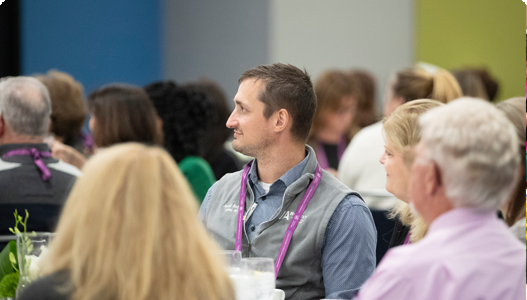
Monday, October 6 8:30am – 5:00pm
$45

Tuesday, October 7 8:30am – Noon
$45

Tuesday, October 7 1:00pm – 4:00pm
$150

Tuesday, October 7 5:30pm – 7:00pm
$150

Tuesday, October 7 5:30pm – 7:00pm
$500

Tuesday, October 7 7:30pm – 10:00pm
FREE
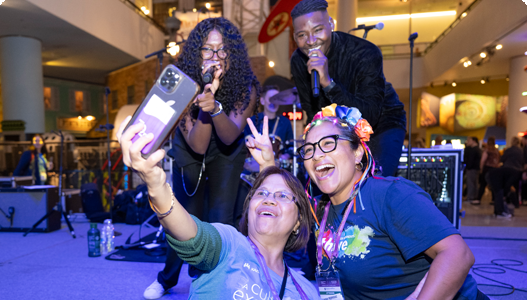
Wednesday, October 8 7:00 pm – 10:00 pm



